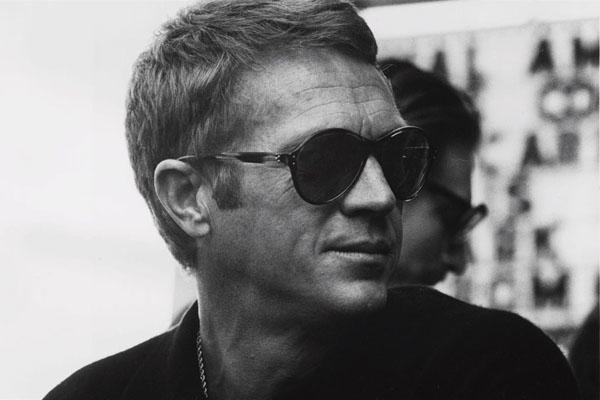"It was all very pleasant just lying in the sun and watching the girls go by, but one day, I suddenly felt bored with hanging around and went and joined the Marines," said no one ever.
Wait, someone did actually say (and do) that. The Cooler King, the King of Cool -- Steve McQueen -- who is a definite candidate for the Most Interesting Man in the World.
In the 1960s and '70s, no American actor personified cool like Steve McQueen. Whether the role was race-car driver, detective, card player, gun for hire, escaping World War II prisoner of war or thief, casting McQueen made the character that much cooler -- and sometimes iconic.
No wonder he was one of the best-paid actors in Hollywood. But it was a long road to Los Angeles from his hometown outside Indianapolis. He was the love child of a stunt pilot, and his mother left the young boy on a farm with his grandparents, which was the best part of his childhood, he once told a journalist.
Eventually, his mother asked for him to be sent to live with her in Los Angeles. His then-stepfather was abusive, and Steve found himself on the streets at age 9, roaming around with a gang. He soon found himself in a juvenile detention facility, where he was unpopular with the other boys.
At age 16, he moved to New York with his mother, where he met two merchant mariners. They convinced him to join the U.S. Merchant Marine, his first taste of service. At his first stop in the Dominican Republic, he quickly abandoned his post and started working in a brothel.
From there, McQueen drifted about, doing odd jobs such as lumberjacking in Canada or selling pens in Texas. He was eventually arrested for vagrancy in the Deep South of the United States and forced to work 30 days on a chain gang.
In 1947, at age 17, McQueen received permission from his mother to join the Marine Corps. He went through basic training at Parris Island, South Carolina. Initially, he was promoted to private first class in an armored division, but had trouble with authority and was demoted to private no less than seven times. At one point, he went absent without leave to spend two weeks with his girlfriend and was confined to the brig for 41 days.
Somehow, McQueen was assigned to the honor guard protecting the presidential yacht, the USS Williamsburg, where he spent the rest of his career until leaving the Marines in 1950.
Despite his trouble adjusting to military life, he remembered the Marine Corps fondly, saying, "The Marines made a man out of me. I learned how to get along with others, and I had a platform to jump off of."
Related: To create a personalized transition plan for yourself, and for transition guides and checklists, visit the Military.com Transition Center.
The GI Bill he earned as a Marine allowed McQueen to study acting in New York at Sanford Meisner's Neighborhood Playhouse and at HB Studio under famed actress Uta Hagen. To earn money while in school, he began racing motorcycles -- and he was good at it.
He soon had a couple of bikes of his own, along with a burgeoning stage career, and was ready to leave New York for Los Angeles. He was first noticed during an appearance on the CBS anthology series "Westinghouse Studio One" in a two-part crime show called "The Defenders."
McQueen's new manager got him roles in B movies to build his repertoire. His first role was alongside a young Paul Newman, but his breakout came on the CBS television western "Wanted: Dead Or Alive." Steve McQueen was soon a household name.
By age 29, he'd come a long way from the brothels of the Dominican Republic, starring alongside Frank Sinatra in "Never So Few." Then came "The Magnificent Seven," alongside Yul Brenner, Eli Wallach, Robert Vaughn, Charles Bronson, Horst Buchholz and James Coburn. After that, he was done with television.
Next came "The Great Escape" and a slew of other hit movies; an Academy Award nomination; and his own favorite film, "Bullitt," and its legendary car chase scene -- in which McQueen does some of the driving himself.
Although the 1970s were less kind to his career, his reputation never suffered. He worked until he was diagnosed with mesothelioma in 1980. After doctors removed a series of tumors from the actor's neck, a heart attack ended his life at age 50.
-- Blake Stilwell can be reached at blake.stilwell@military.com. He can also be found on Twitter @blakestilwell or on Facebook.
Want to Know More About Veteran Jobs?
Be sure to get the latest news about post-military careers, as well as critical info about veteran jobs and all the benefits of service. Subscribe to Military.com and receive customized updates delivered straight to your inbox.












